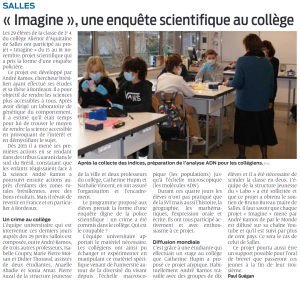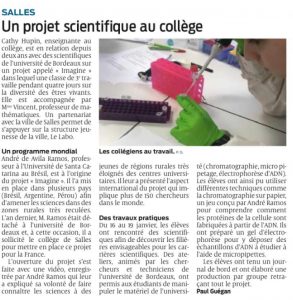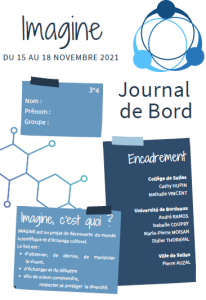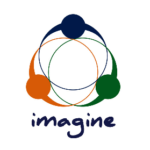Imagine-France
The Imagine-France project is a branch of the international Imagine project, created in 2013 by Prof. André Ramos and his team of researchers, professors and students at the Federal University of Santa Catarina (UFSC), Brazil. The specific objectives are:
1) To offer practical scientific activities, in a didactic and entertaining way, to rural communities and schools located far from major academic centers;
2) To develop innovative educational tools, adapted to the project’s target audience, which will be made available digitally, in several languages, as Open Educational Resources (OER);
3) Offer schools and other members of these communities the opportunity to interact with scientists and students from top-level universities and research institutes;
4) Produce and broadcast a series of web documentaries on the scientific, cultural and human aspects of the project’s workshops.
More specifically, we adapted and developed the Imagine project’s “DNA, diversity and heredity” module and held it in a school in Salles (a small town in a rural area 50 km from Bordeaux). Over four days, the 9th graders followed a series of practical lessons to learn things like using micropipettes, extracting DNA from human saliva, making agarose gels, electrophoresis, analyzing biodiversity and human variability using PCR and understanding gene expression using a specific game (Ima-gene) made of wooden pieces.
We also introduced additional activities, such as “CSI”, in which several DNA samples taken from clues found at a crime scene are extracted and the genetic fingerprints are analyzed; and an “Escape game” created by the local school teacher (Cathy Hupin) to discuss the concepts of classification and measurements at different levels of precision.
THE FIRST THREE WORKSHOPS OF THE IMAGINE-FRANCE PROJECT WERE A SUCCESS!!!
“Imagine biodiversity on a molecular scale”
Collège Aliénor d’Aquitaine, Salles, Gironde (France) – Nov 2021, Jan 2023 e Jan 2024
![]() All the educational resources presented on this page are open.
All the educational resources presented on this page are open.
If you would like to replicate this workshop in a French school, please contact our representatives in France, Dr. Marie-Pierre MOISAN (marie-pierre.moisan@inrae.fr) and Prof. Cathy Hupin (catherine.baudet@orange.fr). For information about the Imagine project in other countries, please contact Dr. André RAMOS (deavilaramos@gmail.com).
Mini-documentary directed by Dr. Marie-Pierre MOISAN (INRAe, France)
What the French press had to say about the first three editions (2021, 2023, 2024).
 Sud-Ouest – 24/11/21 (cliquez ici pour lire le texte complet)
Sud-Ouest – 24/11/21 (cliquez ici pour lire le texte complet)
 Le Belinétois – 27/01/2023 (cliquez ici pour lire le texte complet)
Le Belinétois – 27/01/2023 (cliquez ici pour lire le texte complet)
 Sud-Ouest – 26/01/23 (cliquez pour augmenter)
Sud-Ouest – 26/01/23 (cliquez pour augmenter)
Echosciences Nouvelle-Aquitaine – 11/04/23 (cliquez ici pour lire le texte complet)
Le Belinétois – 07/02/2024 (cliquez ici pour lire le texte complet)
Le Belinétois – 23/04/2024 (cliquez ici pour lire le texte complet)
IMAGINE-FRANCE WINS REGIONAL FINAL OF CGÉNIAL CONTEST 2024 AND PARTICIPATES IN NATIONAL FINAL IN PARIS
CGÉNIAL COMPETITION 2024
THE REGIONAL FINAL
The C Génial competition is a French national science competition for primary and secondary school students. It allows young people, with the help of their teachers, to present an innovative project in a wide range of disciplines, such as physics, chemistry, mathematics, technology, life and earth sciences, etc. This teamwork allows students to question themselves, follow a scientific approach, carry out experiments and present their project to a panel of judges.
Every year, the educational authority of the Bordeaux region (Aquitaine) organizes the final of the C Génial competition at CEA CESTA in Le Barp. For this 17th edition, which took place on April 4, 2024, 12 elementary schools took part by presenting their projects.
The Collège Aliénor d’Aquitaine in Salles was one of the academic finalists with our project. Seven girls from the 3ème 7 class (equivalent to 8th grade in Brazil) volunteered to present the project “Imagine biodiversity on a molecular scale”. The presentation took place on Thursday, April 4th. They gave a 10-minute oral presentation, followed by a 10-minute question and answer session in front of two different panels of judges, at 10.30am and 12pm.
They also presented their project to all the students and teachers who visited their stand. They came first out of all the schools in the Aquitaine region and therefore qualified to go to Paris on May 15 to present their project at the national final. The trip was funded by the C Génial foundation, which organizes the competition.
THE NATIONAL FINAL
– PARIS (Air and Space Museum) –
Congratulations to all the participating teams for their projects, one more ingenious, exciting and unique than the other. Unfortunately, our team was not awarded a prize in the national final, but we hope that this experience has aroused scientific curiosity in all the participants, given them the chance to practice science in a fun and original way and encouraged them to carry out scientific projects.
- Todos/as reunidos/as
- O Dream Team
- O trio oficial
- Debaixo do Concorde
- Stand do Imagine
- Quem estava lá?
The Defended Project
Click to open the “Imagine Biodiversity on a Molecular Scale” project
MATÉRIELS DIDACTIQUES
These are all Open Educational Resources. Except where otherwise noted, content on this site is licensed under a Creative Commons Attribution-NonCommercial-ShareAlike 4.0 International
Journal de Bord
 Journal de Bord 2024 (par Cathy Hupin)
Journal de Bord 2024 (par Cathy Hupin)
Escape Game : “Quelle pagaille, professeur Ramos !”
Plan escape game (par Cathy Hupin)
Vidéo d’Introduction au Game
Activité Numérique “Les Dimensions du Vivant”
Le monde est fait de choses de différentes tailles : des objets plus petits que des grains de poussière aux énormes montagnes ! Avec les êtres vivants, ce n’est pas différent : nous, les autres animaux et même les plantes, sommes formés par des organes tels que le cœur et les poumons. Ceux-ci, à leur tour, sont faits de choses encore plus petites, appelées cellules, qui ont des choses encore plus petites à l’intérieur. Nous montrons ici un monde microscopique (c’est-à-dire qui ne peut être vu qu’à l’aide d’un microscope), en utilisant, comme référence, des choses macroscopiques bien connues de notre vie quotidienne. Allez, il est temps de commencer un voyage à travers les différentes échelles qui font la vie !
La Diversité de l’Humanité
Les élèves reçoivent des cartes avec des photos de gens de différentes régions du monde et doivent les placer, après une discussion menée dans chaque équipe, sur un panneau contenant une map du monde sans frontières. Ensuite, une discussion collective sur la variabilité humaine et les différentes façons de la voir et de l’interpreter sera proposée.
IMA-GÈNE: Le Jeu du Code Génétique
Ce jeu éducatif fait en bois a déjà été appliqué dans l’éducation secondaire et dans l’enseignement supérieur, auprès d’enfants et d’adultes, dans des écoles urbaines et rurales, en Amérique du Sud, en France et en Afrique. Créé pour enseigner le CODE génétique, les MUTATIONS (comme celles qui altèrent le virus SARS-CoV-2), L’EXPRESSION GÉNIQUE et même la PHILOGÉNIE, le jeu Ima-Gène est une ressource éducative ouverte.
LES MOTS DES ÉLÈVES

PHOTOS DE LA PREMIÈRE ÉDITION (2021)
PHOTOS DE LA DEUXIÈME ÉDITION (2023)
PHOTOS DE LA TROISIÈME ÉDITION (2024)
- O Dream Team
- Stand do Imagine
Pages: 1 2














































